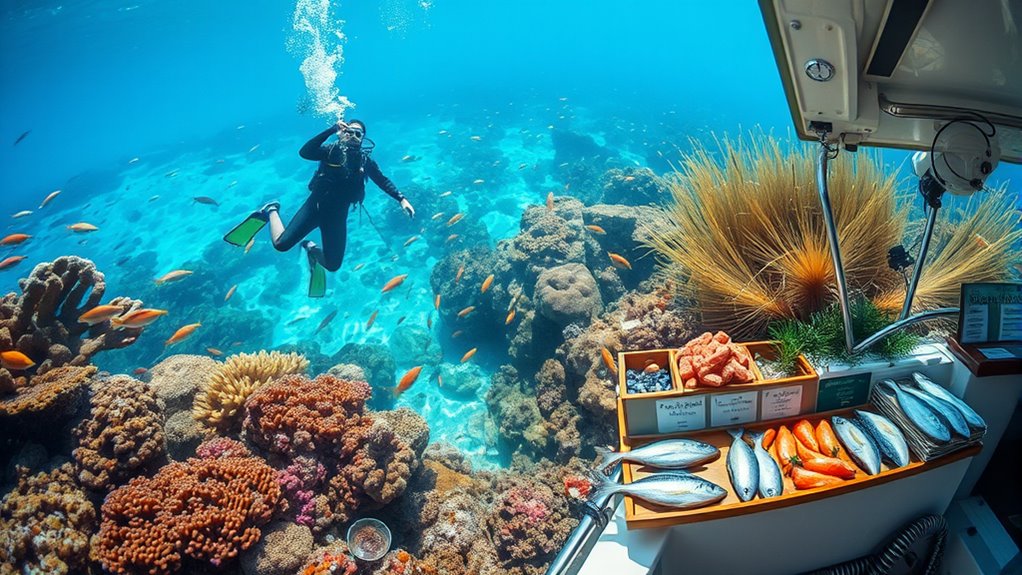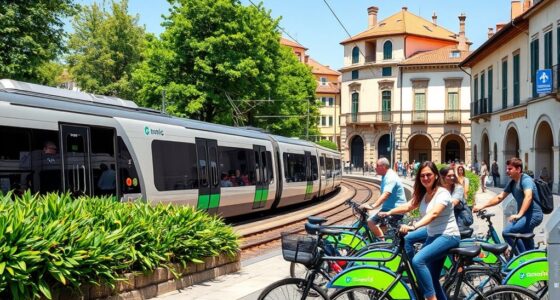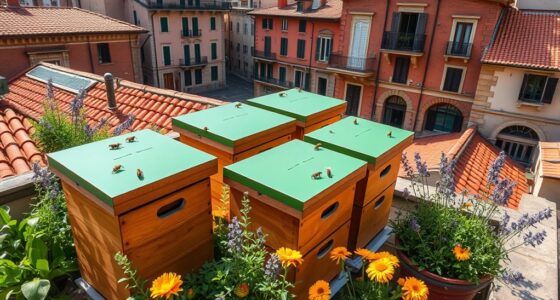To protect Mediterranean marine life, choose seafood that’s sustainably farmed or responsibly caught. Look for certifications like ASC or BAP, which guarantee farms use eco-friendly practices and reduce environmental harm. Ask markets or restaurants about where their seafood comes from and support suppliers committed to healthy water quality and responsible fishing methods. Your choices influence industry practices and help maintain the balance of marine ecosystems. Keep exploring to discover more ways to make a difference.
Key Takeaways
- Choose seafood with certifications like ASC or BAP to ensure responsible farming practices that minimize environmental impact.
- Support local, seasonal, and sustainably caught species to reduce overfishing and habitat destruction in the Mediterranean.
- Ask vendors and restaurants about sourcing methods to promote transparency and encourage sustainable supply chains.
- Avoid overfished or vulnerable species to help maintain balanced marine ecosystems and prevent species decline.
- Use sustainable seafood guides or apps to make informed choices that protect Mediterranean marine life.

Are you wondering how to enjoy seafood without harming the environment? It’s a valid concern, especially as the demand for marine products increases. Understanding aquaculture impacts is essential to making responsible choices. Aquaculture, or fish farming, has become a significant source of seafood worldwide, including in the Mediterranean. While it offers a way to meet demand without overfishing wild stocks, it also comes with environmental challenges. Poorly managed aquaculture can lead to habitat destruction, water pollution, and the spread of disease among wild populations. These impacts threaten marine ecosystems and undermine the sustainability of fish stocks you might want to support. That’s why consumer awareness plays a *pivotal* role in fostering sustainable practices. When you know which seafood options are farmed responsibly or caught sustainably, you can make choices that help protect marine life rather than harm it.
Being informed about aquaculture impacts allows you to identify farms and products committed to environmentally friendly practices. Look for certifications like the Aquaculture Stewardship Council (ASC) or Best Aquaculture Practices (BAP), which set standards for responsible farming. These certifications indicate that the seafood was produced with attention to water quality, feed sources, and waste management, reducing negative environmental effects. Additionally, understanding the importance of local and seasonal seafood helps you avoid the pitfalls of large-scale, intensive aquaculture operations that often prioritize quantity over sustainability. By choosing local, seasonal options, you support fisheries that follow eco-friendly practices and help maintain the natural balance of Mediterranean marine ecosystems.
Moreover, consumer awareness extends beyond certifications. Educate yourself about the species that are overfished or vulnerable in the Mediterranean region. For example, some species may be caught using methods that damage habitats or cause bycatch of non-target species. When you’re aware of these issues, you can ask questions at markets and restaurants, encouraging transparency and responsible sourcing. This, in turn, pressures suppliers to adopt sustainable practices. Participating in sustainable seafood guides or apps can further inform your choices, providing up-to-date information on the best options available. In doing so, you’re not only protecting marine life but also promoting a healthier, more resilient ecosystem for future generations. Your choices matter—by prioritizing sustainably farmed or caught seafood, you contribute to a balanced Mediterranean marine environment that benefits everyone.
Frequently Asked Questions
How Does Overfishing Impact Mediterranean Marine Ecosystems?
Overfishing damages Mediterranean marine ecosystems by depleting fish populations and disrupting the food chain. It also causes habitat destruction and increases bycatch, harming non-target species like seabirds and sea turtles. When you choose sustainable seafood, you help support bycatch reduction efforts and preserve delicate habitats. This guarantees healthier ecosystems, more resilient fish stocks, and a balanced marine environment for future generations. Your choices truly make a difference.
Which Seafood Certifications Guarantee Sustainable Mediterranean Seafood?
You’ll want to look for certifications like the Marine Stewardship Council (MSC) and Aquaculture Stewardship Council (ASC). These guarantees are like a lighthouse guiding you through sustainable choices, ensuring seafood is sourced responsibly. They verify eco-friendly aquaculture practices and responsible fishing in marine protected areas. Trust these labels to help you enjoy Mediterranean seafood while protecting fragile marine ecosystems—your choices can make waves in conservation efforts!
What Are the Most Threatened Species in the Mediterranean?
You should know that endangered species like the Mediterranean monk seal, dusky grouper, and certain shark species face significant threats in the region. Conservation efforts are vital to protect these species from overfishing and habitat loss. By supporting sustainable seafood choices and awareness initiatives, you help preserve these vulnerable populations, ensuring the Mediterranean’s rich marine biodiversity remains resilient for future generations.
How Can Consumers Identify Sustainable Seafood Options Locally?
Did you know only 1 in 5 seafood products has reliable labeling? To identify sustainable seafood locally, look for clear seafood labeling that indicates eco-friendly sources. Consumer education plays a key role—ask vendors about the origin and fishing methods. Support local initiatives and certified labels like MSC or ASC. By staying informed and asking questions, you help protect Mediterranean marine life and make eco-conscious choices.
What Policies Support Marine Conservation in the Mediterranean Region?
You can support marine conservation in the Mediterranean by advocating for policies that expand Marine Protected Areas and enforce strict fishing regulations. These policies help safeguard marine biodiversity, prevent overfishing, and restore fish populations. By choosing seafood from regions with strong conservation policies, you encourage governments to prioritize sustainable practices, ensuring the health of Mediterranean ecosystems for future generations. Your awareness and support make a significant difference in marine conservation efforts.
Conclusion
By choosing sustainable seafood, you’re like a captain steering a fragile ship through stormy waters—your choices can help preserve Mediterranean marine life for generations. Imagine a fisherman who switches to eco-friendly methods and sees his catch flourish; your decision can be that ripple of change. Remember, every small act counts. When you opt for sustainable options, you’re not just eating well—you’re safeguarding a vibrant ocean teeming with life, ensuring its beauty endures.









